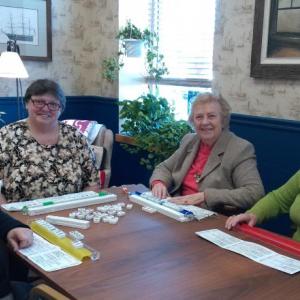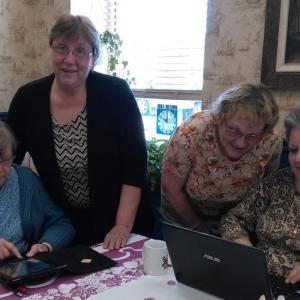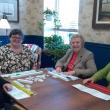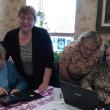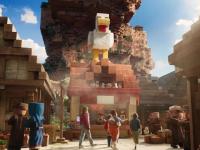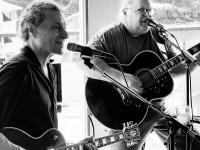The emperor’s game and your great-granny’s granny
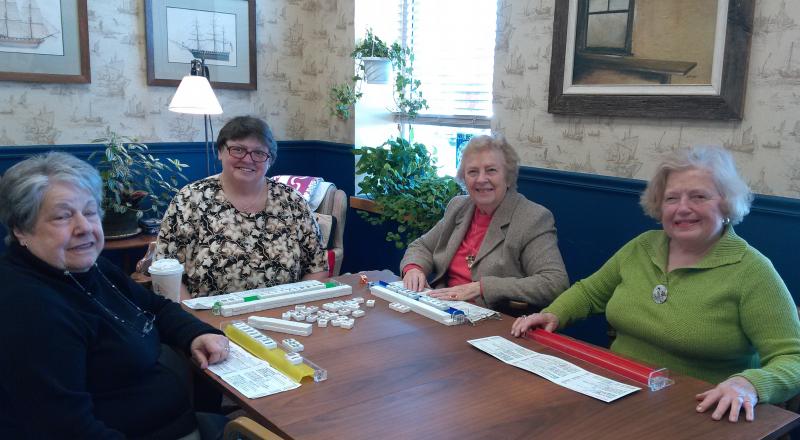 Mahjong class includes, from left, Mary Ann Morse, Cathy Tyler, instructor Marion Bates and Norma Scala. JANE CARPENTER/Boothbay Register
Mahjong class includes, from left, Mary Ann Morse, Cathy Tyler, instructor Marion Bates and Norma Scala. JANE CARPENTER/Boothbay Register
 Instructor Lucy Cressey (standing, left) assists (from left) Sandra Barth, Cathy Orne and Betty Sullivan in their search for information. JANE CARPENTER/Boothbay Register
Instructor Lucy Cressey (standing, left) assists (from left) Sandra Barth, Cathy Orne and Betty Sullivan in their search for information. JANE CARPENTER/Boothbay Register
 Mahjong class includes, from left, Mary Ann Morse, Cathy Tyler, instructor Marion Bates and Norma Scala. JANE CARPENTER/Boothbay Register
Mahjong class includes, from left, Mary Ann Morse, Cathy Tyler, instructor Marion Bates and Norma Scala. JANE CARPENTER/Boothbay Register
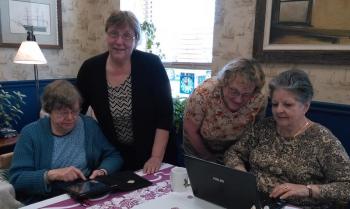 Instructor Lucy Cressey (standing, left) assists (from left) Sandra Barth, Cathy Orne and Betty Sullivan in their search for information. JANE CARPENTER/Boothbay Register
Instructor Lucy Cressey (standing, left) assists (from left) Sandra Barth, Cathy Orne and Betty Sullivan in their search for information. JANE CARPENTER/Boothbay Register
If you are feeling a little restless waiting for spring to settle in, Tuesdays at the Boothbay Region Community Center might just offer some interesting alternatives.
You could, for example, join the mahjong class which meets from 10 a.m. until noon, every Tuesday for an eight-week session. Marion Bates, who is the group’s instructor, explains that the game began in China hundreds of years ago as a card game played only by the imperial family and the court.
In the 1920’s, mahjong made its way to the U.S. and evolved into what is known as the “American version” of the game which Bates said is similar to rummy, and played with tiles. “The game is complicated, but even a child can grasp it,” said Bates, who has taught 127 area players since 2002.
Area players join the National Mahjong League for $9 each year. The funds are collected by Sarah Seepe, who is also a local instructor. The league returns $2 for each player which is to be used for charity. “Over the years, we have contributed to the libraries, high school scholarships, and this year the group has chosen to contribute to the food pantry.”
Bates provides mahjong sets at the community center for those who do not have their own set.
Tuesday afternoons at the center offer an opportunity to find your ancestors through the genealogy class taught by Lucy Cressey. The group meets for two hours at 2 p.m. When the Register recently paid a visit, we found some class members whose search has continued for decades.
Cathy Orne has been at work on her family’s history for 20 years and has been able to trace one side of the family back to the 1400s. Sandra Barth’s 25-year investigation has taken her to the 1600s after her mother gave her a file with the family history. “And that got me started,” she explained.
Betty Sullivan has been trying to answer questions about what happened to previous generations of her family. “I found out that some members were placed in foster care long ago and I wonder what happened in the family.”
Cressey’s interest began when she acquired her late father’s research. “We found that his family was one of the founding families of Rhode Island,” she said.
The group usually has 6 to 8 people that join the Tuesday sessions and Cressey said she provides tips and acts more as a facilitator than instructor.
Research into the past is alternately characterized as “fun” (according to Orne,) “a boon and a curse” (according to Barth who works late into the night) and “feast or famine,” (according to Cressey.)
The results can be used for everything from family reunions to academic scholarships. “Some organizations are offering scholarships to students from specific backgrounds,” Cressey explained.
The classes are also assisted by two members of the Church of Jesus Christ of Latter-day Saints, who are on their mission and helping the class by searching the Church’s records, which include the largest genealogical library in the world.
For more information on the classes, call the center at 633-9876.
Event Date
Address
United States

